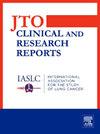Nivolumab和Ipilimumab治疗胸膜间皮瘤在持续缓解后疾病进展:病例系列
IF 3.5
Q2 ONCOLOGY
引用次数: 0
摘要
CheckMate 743试验建立了nivolumab和ipilimumab作为不可切除胸膜间皮瘤的标准一线治疗方法。然而,在对双重免疫治疗产生持久反应后,疾病进展后的最佳管理仍不清楚。我们报告了两例胸膜间皮瘤(上皮样亚型)患者最初使用尼伏单抗-伊匹单抗治疗,实现了长期的疾病控制。两名患者在停药几年后均出现疾病进展,随后经监管部门批准使用尼伏单抗-伊匹单抗进行治疗。在这两个病例中,再治疗导致疾病稳定至少12个月。然而,发生了免疫相关的毒性,一名患者出现复发性结肠炎,另一名患者出现肾病综合征,最终导致治疗中断。这些病例表明,尽管免疫相关毒性的风险仍然很大,但对于先前有持久反应的选定患者,双重免疫治疗可能是一种可行的策略。鉴于缺乏前瞻性数据,需要进一步的研究来确定在这种情况下,与化疗或最佳支持治疗相比,nivolumab-ipilimumab的再挑战是否能提供更好的结果。对胸膜间皮瘤患者在持久反应后再用纳武单抗-伊匹单抗治疗是可行的,但与免疫相关的毒性有关。本文章由计算机程序翻译,如有差异,请以英文原文为准。
Retreatment With Nivolumab and Ipilimumab in Pleural Mesothelioma Following Disease Progression After a Durable Response: Case Series
The CheckMate 743 trial established nivolumab and ipilimumab as the standard first-line treatment for unresectable pleural mesothelioma. However, optimal management following disease progression after a durable response to dual immunotherapy remains unclear. We report two cases of patients with pleural mesothelioma (epithelioid subtype) initially treated with nivolumab-ipilimumab, achieving prolonged disease control. Both patients experienced disease progression several years after treatment discontinuation and were subsequently retreated with nivolumab-ipilimumab on regulatory approval. In both cases, retreatment resulted in stable disease for at least 12 months. However, immune-related toxicities occurred, with one patient developing recurrent colitis and the other experiencing nephrotic syndrome, ultimately leading to treatment discontinuation. These cases suggest that retreatment with dual immunotherapy may be a viable strategy for selected patients with previous durable responses, although the risk of immune-related toxicity remains significant. Given the lack of prospective data, further research is needed to determine whether rechallenge with nivolumab-ipilimumab offers superior outcomes compared with chemotherapy or best supportive care in this setting. Rechallenging patients with pleural mesothelioma with nivolumab-ipilimumab after a durable response is feasible but associated with immune-related toxicity.
求助全文
通过发布文献求助,成功后即可免费获取论文全文。
去求助
来源期刊

JTO Clinical and Research Reports
Medicine-Oncology
CiteScore
4.20
自引率
0.00%
发文量
145
审稿时长
19 weeks
 求助内容:
求助内容: 应助结果提醒方式:
应助结果提醒方式:


